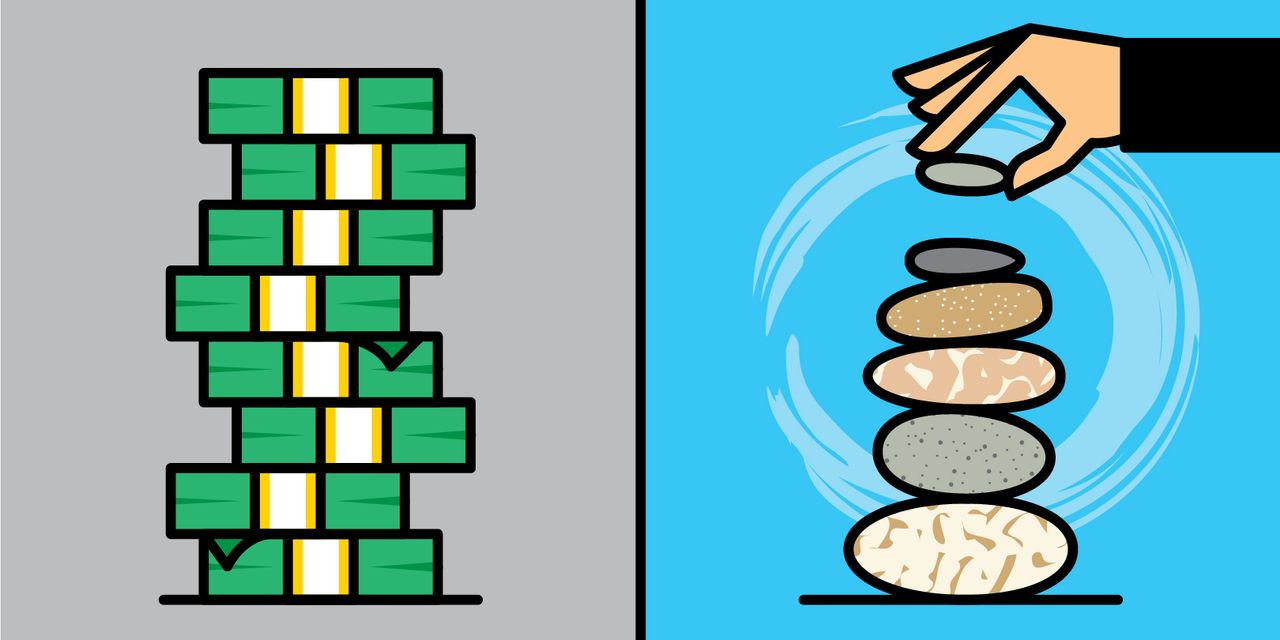“Wealthy” is a subjective term. Charles Schwab recently surveyed what Americans think it means to be wealthy and discovered that respondents had sharply different opinions when asked about themselves—and others.
Forty-eight percent of respondents said they considered themselves wealthy. They reported an average net worth of $560,000 and cited nonfinancial factors like health and family in estimates of their “wealth.” But when asked how much money it takes to be wealthy in America, their answers averaged out to $2.2 million.
Schwab calls this the “wealth paradox.” Jonathan Craig, the company’s head of investor services, interprets this positively: People are taking a broader view of their overall well-being.
“Americans today aren’t as worried about keeping up with the Joneses, and more importantly, they understand that they can be happier with fulfilling experiences and relationships, even if they have less money,” he says.
Schwab asked questions formulated as, “What wealth means to me…this or that?” For instance, 70% said wealth is more about enjoying experiences than owning nice things. Respondents split similarly when asked whether wealth means not having to stress about money (70%); far fewer said wealth meant having more money than most people they know (30%). Sixty-nine percent said that a healthy work/life balance is a greater driver of wealth than maximizing earnings. They said they would rather have a flexible work life than a higher salary, and more said it’s important to be generous with loved ones now than to leave an inheritance.
Email: [email protected]
Last Week
Hawk Watch
Markets opened in an upbeat mood as investors waited for the Federal Reserve’s interest-rate decision. Inflation rose 4% year over year in May, down from 9.1% in June 2022. The Fed’s decision was expected; the hawkish forecast wasn’t. The ECB raised and China eased. The stock rally continued and widened, then fizzled on Friday. On the week, the Dow Jones Industrial Average rose 1.25%, to 34,299.12; the S&P 500 surged 2.58%, to 4409.59; and the Nasdaq Composite soared 3.25%, to 13,689.57.
The Pause
The Fed chose to hold rates steady after 10 hikes, but forecast two more raises by year end and a hawkish peak of 5.5% to 5.7%. Chairman Powell said that a large majority of the committee expected more tightening and the pause—don’t call it a skip—was needed to monitor credit conditions.
Trump in Miami
Former President Trump pleaded not guilty at his arraignment in Miami federal court on charges of mishandling classified documents.
The Early Offensive
Ukrainian President Zelensky confirmed a counteroffensive was under way and said the goal was to liberate 18% of territory seized by Russia. Russian President Putin appeared to side with the Ministry of Defense over irregular forces like Yevgeny Prigozhin’s Wagner Group. Belarus received its first Russian nuclear weapons.
The Corporate Front
The Wall Street Journal reported the U.S. expected to give some major chip makers operating in China, like
Samsung Electronics
and
Taiwan Semiconductor,
export-control exemptions…An FDA advisory board recommended approving
Biogen’s
Leqembi, an Alzheimer’s drug it developed with Japan’s Eisai…The European Union said it was considering breaking up Google’s ad-tech business on antitrust grounds…JPMorgan Chase settled a case brought by sexual abuse victims of financier Jeffrey Epstein for a reported $290 million…BlackRock filed for a Bitcoin exchange-traded fund.
Annals of Deal Making
Illumina
CEO Francis DeSouza resigned over the struggle to buy cancer-screener Grail, which triggered a Carl Icahn proxy battle…UBS completed its takeover of Credit Suisse and announced red lines for bankers, from taking on clients from high-risk countries to money laundering…
Novartis
said it would pay up to $3.5 billion to buy kidney disease specialist Chinook Therapeutics…Nasdaq agreed to buy Thoma Bravo–owned fintech Adenza, a software firm for banks and brokerages, for $10.5 billion…The Federal Trade Commission joined U.K. regulators in suing to block
Microsoft’s
Activision Blizzard
deal…Softbank-backed chip designer Arm talked to Intel about being a strategic investor in its $10 billion IPO…Ag giant
Bunge
said it would buy rival Viterra, which is backed by Swiss miner and trader
Glencore,
for $8.2 billion. Meanwhile, Glencore offered to buy
Teck Resources
’ coal business rather than, as it had earlier proposed, Teck itself.
Write to Robert Teitelman at [email protected]
Read the full article here



